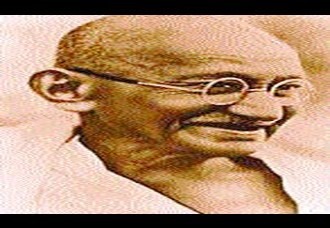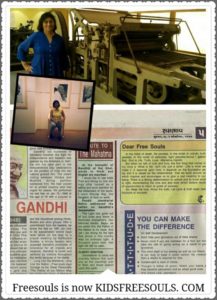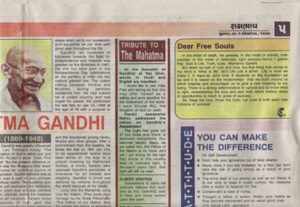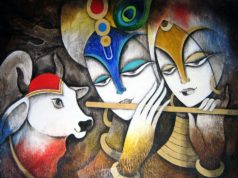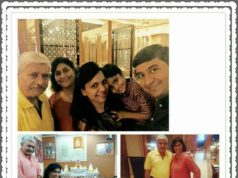Lead me from Unreal to the Real, From Darkness to Light, From Death to Immortality – The vedic verse chanted at Gandhiji’s Funeral pyre In the midst of death, life persists, In the midst of untruth, truth persists, In the midst of darkness, light persists,Hence I gather that God is Life, Truth, Love. -Mahatma Gandhi
But when we talk of truth and love,the first thing that comes in my mind is ‘What is life’. Isn’t Life just a strife! Life is what we make it .It depends upon love, it depends on the foundation we lay and it is based on the relationships that we build around us which inspires and encourages us to give a real meaning to our being.
There is a strong determination to uphold and to know what is right, remembering the love and and truth which widens doors of opportunities to reach to goals of success.
So, Keep the love, Know the truth, Let Love & truth open new horizons of success!
– ilaxi patel, Ed, www.kidsfreesouls.com |
Click for my Gandhiji supplement Page Print media (past issue) | Press page
Born on 2nd October, 1869, Mahatma Gandhi’s Ideology on Education has ever been so inspiring as he placed importance on Observation skills. He said, “A student means one who has hunger for knowledge. True knowledge is first and foremost to know own self. To attain this, one must know literature, history, geography, mathematics and so on. A real student will pursue to learn more at every stage and dedicate himself to attain knowledge which is an unending process. One has to develop habits of observation. One would not, then, always need a multitude of teachers or rather, would look upon the world as one’s teacher and accept everything in it which is good.” Gandhiji inspired the inner spirit of the nation too – all with his spirit of truth and non violence. He left us the legacy of ahimsa, love and tolerance. Today, we salute the personality and pay our respects as even the nation. Gandhiji has emphasized social awareness amongst children and follow the path of truth and do what is good and honest. Click here for Gandhiji’s profile and Gandhi Quiz from his book ‘My Experiments of Life’. Gandhiji’s page on Kidsfreesouls has ever been the highest surfed pages through Google Search and as I keep more contents posted on this, stay tuned.
Mohandas Karamchand Gandhi ‘The Mahatma’
Mahatma, The Great Soul, was born on 2nd October 1869 in Porbandar. He helped to free India from British rule by a unique method of non violence resistance and is honoured by Indians as the Father of the Nation. He possessed limitless physical and moral strength. He was assasinated by an Indian who resented Gandhi’s programme of tolerance for all creeds and religions.
Gandhiji was a person who believed in the dignity of man and left us all a legacy of ahimsa, love and tolerance. His life was guided by a search for truth. In the ‘My Experiments of the Truth’, Gandhiji stressed that truth was god and his aim in life was to achieve truthfulness in thought, word and deed. Ahimsa, to him was the highest virtue. By non violence, Gandhi meant not merely the absence of violence but also loving concern for all life. He believed that truth could be known only through tolerance and concern for others and that find a truthful way to solutions required constant testing. He taught that to be non-violent required great courage. He adopted Satyagraha based on principles of courage, non-violence and truth. This method was used to fight for India’s independence and to bring about social change.
Gandhiji was greatly influenced by Leo Tolstoy’s essay ‘The Kingdom of God is within you’ and John Ruskin’s book ‘Unto This Last’. But the greatest influence on him was the ‘Bhagwad Gita’ which became an unfailing source of inspiration. Gandhi believed that all life was a part of one ultimate spiritual reality. The supreme goal was self-realization; the realization that one’s true self was identical with ultimate reality. He believed that all religions contain some elements of truth and this accounted for his own religious tolerance. For him, the best guide to self-realization was the Gita. Gandhiji practiced action without desire, which led to non-possession and equability as per Gita with great zeal throughout his life.
Gandhiji led hundreds of followers towards the fight for Independence and the Britishers granted freedom in 1947. He did not take part in the Independence Day celebrations as the partition of India into two nations grieved him. The violent rioting between Hindus and Muslims during partition saddened him. He had craved for a united country and had urged for peace. He performed his last fast on Jan 13, 1948 at the age of 78 with a purpose to end the bloodshed among Hindu, Muslim and other groups. After a commitment from the leaders, be broke the fast on 18th Jan only to be assassinated twelve days later while on his way to a prayer meeting by Nathuram Godse, a Hindu fanatic who opposed Gandhi’s principles of tolerance for all creeds and religions. Gandhiji is loved and admired by millions throughout the world because of his ideals.
Long Live the Mahatma…Long Live the Nation….Kids Free souls pays homage to the Great Personality “The Father of our Nation’ May we imbibe the ideals of Mahatma Gandhi and Heal the World, the way we Can!
SALT SATYAGRAHA – DANDI MARCH
12th March 1930, Gandhiji in his boldest act of civil disobedience against British rule, began a long march to the sea in protest of the British salt tax. Gandhi and his followers eventually reached the Arabian Sea, where they made their own salt by evaporating sea water. The march, which resulted in the arrest of Gandhi and 60,000 others, earned new international respect and support for the leader and his movement. Gandhi’s nonviolent methods, including dramatic hunger strikes, eventually did bring great results to his goal of Indian independence in 1947.
Mahatma Gandhi’s Ideology
On value of Prayer – Do you read something or other regularly? Do you pray as you get up from bed? If you don’t, allow me to remind you about it, for I am certain that prayer does us a world of good. You will realize its value in times of trouble, and even from day to day if you offer it thoughtfully. Prayer is food for the soul. As the body languishes for want of nourishment, even so does the soul wither away without its proper food.
On Education- A student means one who has hunger for knowledge. True knowledge is first and foremost to know own self. To attain this, one must know literature, history, geography, mathematics and so on. A real student will pursue to learn more at every stage and dedicate himself to attain knowledge which is an unending process. One has to develop habits of observation. One would not, then, always need a multitude of teachers or rather, would look upon the world as one’s teacher and accept everything in it which is good.
On Self Development –
* Don’t hide your ignorance out of false shame.
* Never mind if you are mistaken for a fool, but don’t take the risk of going wrong as a result of your ignorance.
* The mind itself is our enemy as well as our friend. It is our duty to keep it under control. No medicine from a doctor is required for this.
* Contentment is best of riches.
* Thought is father of action. Watch your habits as they become permanent and so adopt good ones.
Tribute to ‘The Mahatma’
At the Samadhi of Gandhiji at Raj Ghat, words in Hindi and English are inscribed :
I would like to see India Free and strong so that she may offer herself as a willing and pure sacrifice for the betterment of the world. I want Khudai Raj, the Kingdom of God on earth.
Pandit Jawaharlal Nehru addressed the nation on Gandhiji’s Assasination
‘The Light has gone out of our lives and there is darkness everywhere. Our beloved leader, Bapu, as we called him, the Father of the Nation is no more.. And yet I am wrong for the light that shone in this country was no ordinary light. A thousand years later, that light will still be seen.
ALBERT EINSTEIN
Generations to come will scarcely believe that such one as this (Gandhiji) ever in flesh and blood walked upon this earth.
DALAI LAMA
Gandhi was the great apostle of Peace.
From the pages of Gandhiji’s letters……
Love and truth are two faces of the same coin and both most difficult to practise and the only things worth living for. A person cannot be true, if he does not love all God,s creatures; truth and love are therefore, the complete sacrifice which all should realise this to the fullest measure.
A disciplined conscience is one to obey. It is the voice of God. And undisciplined conscience leads to perdition as the devil speaks through it.
Self confidence is that which remains unshaken even amidst disappointment. If I have faith in truth and non violence, I will stick to them even in adversity.
Purity and restraint are virtues to be treasured.
Arrogance and firmness are generally found together. The best way to overcome arrogance is to try and refrain from reacting to opposition.
The mind itself is our enemy as well as our friend. It is our duty to keep it under control. No medicine from a Doctor is required for this.
We acquire certain habits and then we are unable to do anything different. Thought is the father of the action. So guard your deeds and thoughts because when thought goes, action automatically goes with it.
Gandhi – An Autobiography | Review by Ilaxi:
Gandhiji was a person who believed in the dignity of man and left us all a legacy of ahimsa, love and tolerance. His life was guided by a search for truth. In the `My Experiments of the Truth’, Gandhiji stressed that truth was god and his aim in life was to achieve truthfulness in thought, word and deed. Ahimsa, to him was the highest virtue. By non violence, Gandhi meant not merely the absence of violence but also loving concern for all life. He believed that truth could be known only through tolerance and concern for others and that find a truthful way to solutions required constant testing. He taught that to be non-violent required great courage. He adopted Satyagraha based on principles of courage, non-violence and truth. This method was used to fight for India’s independence and to bring about social change. The book has exceptional revelations of Gandhiji’s own life, his experiences, his beliefs and the stepping stone of his career. A widely read and an inspiring collection, Gandhiji’s Autobiography gives a glimpse into the Indian culture and living on path towards Truth & Non violence. A pick for every one who believes in peace n calm.
Mahatma Gandhi’s “Constructive Programme” Ideology
Gandhiji wrote a Constructive Programme Plan in 1941 on various topics relating to Communal unity, Prohibition, Untouchability, Khadi, Education, Women, Language, Economic Equality, Labour, Adivasis, Students, Lepers & Civil Disobedience. His main ideology remained to the fact that its wholesome fulfilment related to Independence. He believed in independence of every unit, be it the humblest of the nation, without discrimination of caste, color or creed with the practice to truth and non violence. He had a voice on every topic but for the basic and adult education, he raised his voice meant for transformations but for the students, he reflected them as the future leaders of the nation. They should take out time devotedly and in one year, according to his theory the students would be progressing mentally, morally and physically with substantial contribution to freedom movement. He bid a standby invitation to join his own university and his follow his ideology with his own terms. These terms were:
Students would not take part in party politics. They would remain students, searchers and not politicians.
They would not resort to political strikes. They should copy the best of their leaders. The students should have confidence that if they are united and dignified in their conduct, they would win. They can unitedly resolve their problems with the authority.
They would do sacrificial spinning in a scientific manner. Preferably learn by themselves, keep tools clean and neat and in good condition. They would product highest quality yarn and read the literature about spinning.
They would be khadi users and avoid all foreign or machine made.
They would not impose ‘vande mataram’ or the National flag on others. They may wear National buttons but not force others to do so.
They can enforce the message of tri color flag in their own persons and harbour neither communalism nor untouchability in their hearts. They should cultivate real friendship with students of other faith.
They would care for others, give first aid to injured neighbours.
Learn the National language, Hindustani, in its present double dress, two forms of speech and two scripts to feel at home.
They would translate into their mother tongue what they learn and spread the word in surroundings.
They would not do anything in secret but keep open cards.
They would be scrupulously correct and chivalrous in their behaviour towards opposite sex.
Free Souls, Think and Ponder! Times have changed. In today’s Technology Age, Can one follow the simple basic Gandhian Ideology and if so, to what extent? Frame your own ‘Student Constructive Plan’ to follow the footprints of the great and find the difference. Only ‘You can Make a Big Difference’
It’s your life, Anyway:-)
THE GANDHI QUIZ
1. What was the educational qualification of Kasturba, Gandhiji’s wife?
2. When young Gandhi was in high school, he mis-spelt a word during exams and his teacher prompted him to copy inspite of the presence of the Education Inspector. What was the word?
3. Gandhi believed that Friends react on one another and was of opinion that in friendship there is very little scope for reform and all exclusive intimacies are to be avoided. Be friend with god and make the whole world your friend, he said. Which place was it where he met this friend who made Gandhiji think like this and why?
4. Gandhi’s uncle had a habit of smoking . Gandhi and his relative formed the habit of smoking stumps of cigarettes thrown away by his uncle and stole servant’s coppers for smoking. What made them leave the habit of smoking?
5. Gandhiji stayed at an Anglo Indian widow’s house in West Kensignton, London where he formed the habit of reading newspapers. Which were the newspapers he read there?
6. While searching for a vegetarian hotel , Gandhiji noticed a book under a glass window which he read and inspired and impressed him to make him decide his mission to spread vegetarianism. Name the book?
7. At 35, Gandhiji took charge of Indian Opinion, weekly Gujarati edition in South Africa. In India, after accepting Editorship of Young India, Gandhiji was keen on conducting a Gujarati paper. Which newspapers did he pull out, one in Hindi and another in gujarati?
8. Which year was 26th January declared as Republic Day of India?
9. Who was the secretary of Mahatma Gandhi?
10. Which year and on what date was Dandi March held by Mahatma Gandhi?
11. Gandhi started Quit India Movement. Which year and what was the call slogan?
12. On January 30, 1948, Nehruji made a tearful announcement on All India Radio. What were the words he used?
ANSWERS
1. Illiterate
2. kettle
3. Rajkot – M.K.Gandhi High School. When Gandhiji’s friend encouraged him to eat meat saying “The English are able to rule over us because they are meat eaters’
4. Desperately, they had to find cigarettes to satisfy their need. They craved for independence and could not do anything without elder’s permission. So, they decided to commit suicide and swallowed two or three seeds of Dhatura seeds but soon realised their folly and bid farewell to the habit of smoking.
5. The newspapers were – The Daily News, The Daily Telegraph & Pall Mall Gazette.
6. The book was ‘Salt’s Plea for Vegetarianism’
7. Navjivan (Gujarati & Hindi) & Young India (gujarati version)
8. 26th January 1950
9. Mahadeo bhai Desai
10. 12 March 1930
11. Quit India Movement ‘1942’ & the slogan was ‘Do or die’
12. The words Nehruji said were “The light has gone out of ourlives and there is darkness everywhere”


